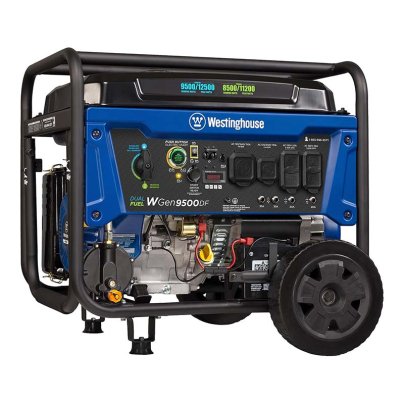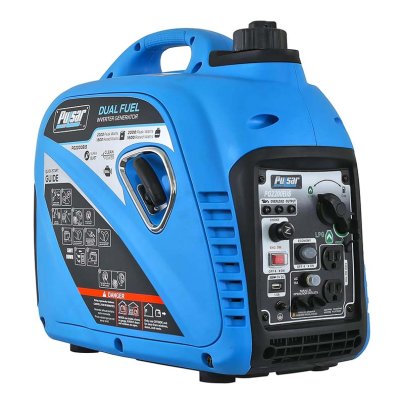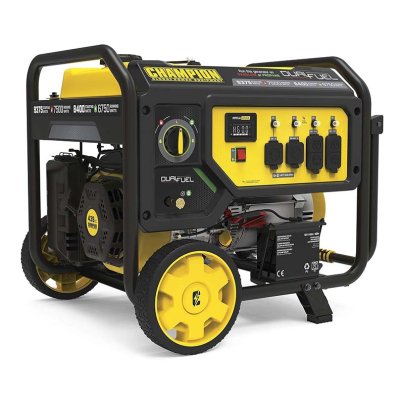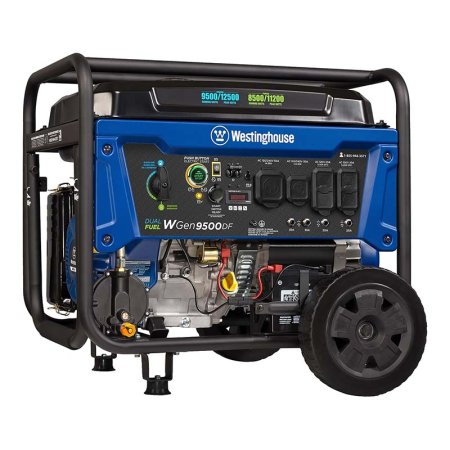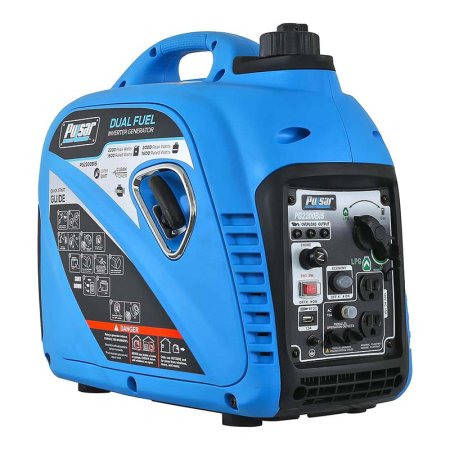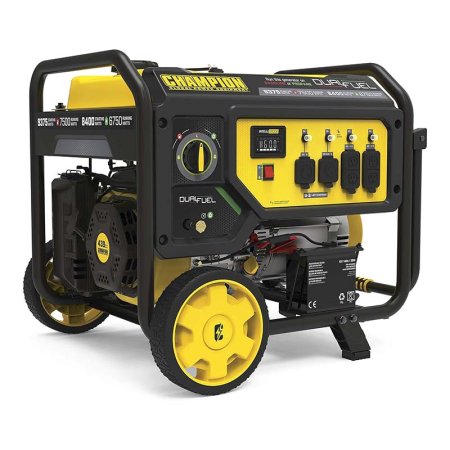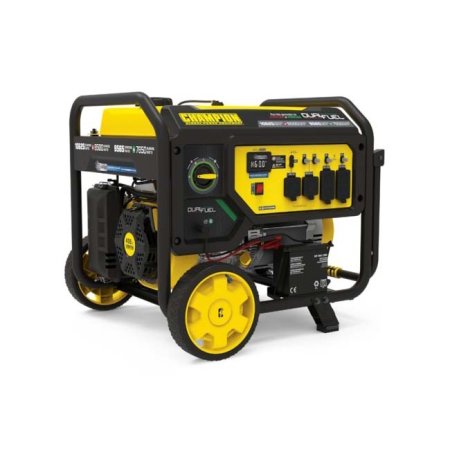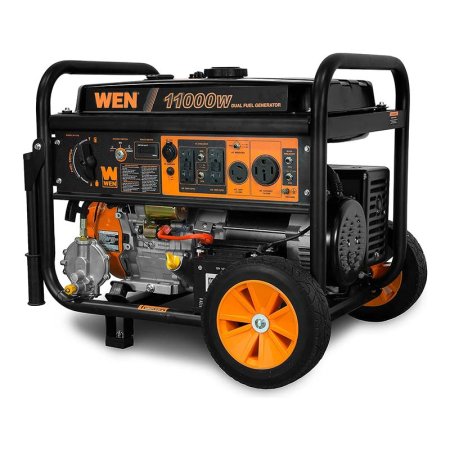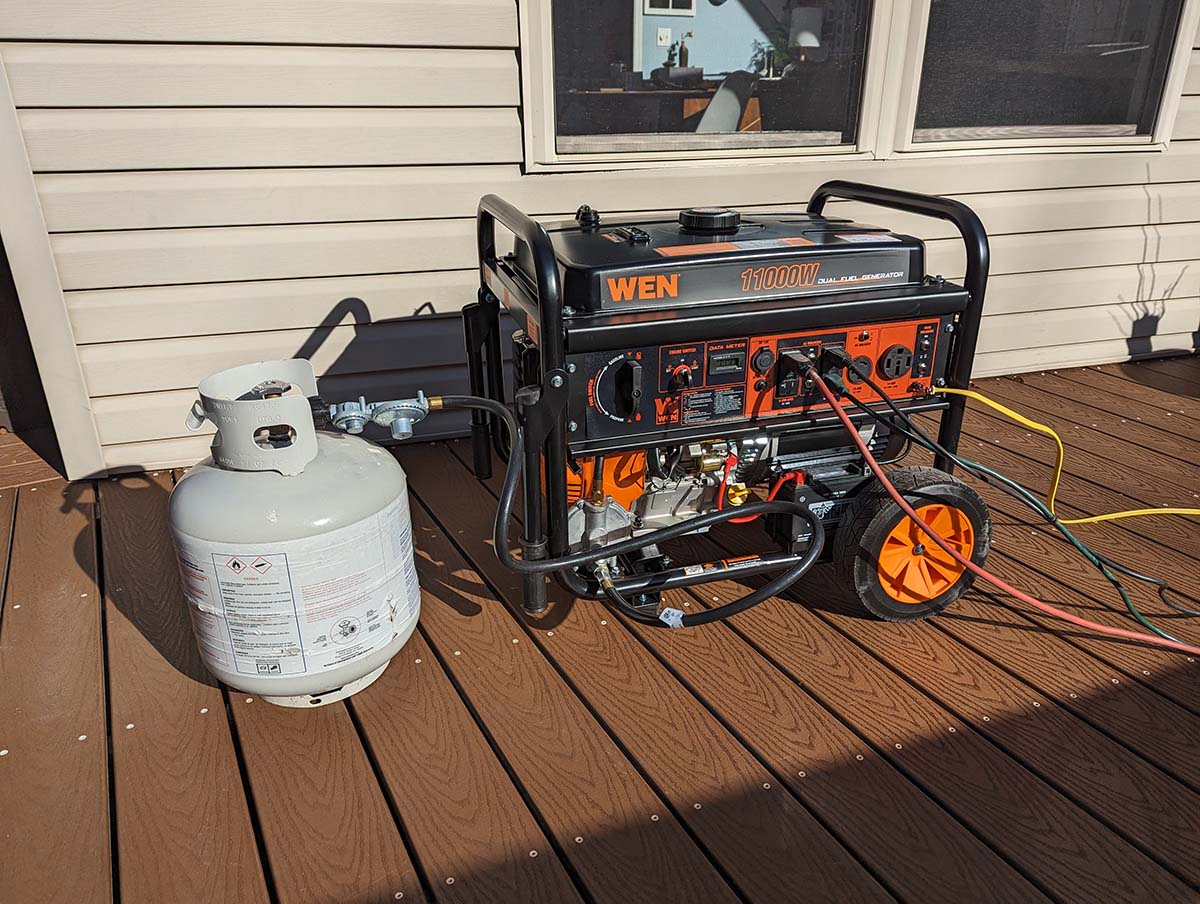
We may earn revenue from the products available on this page and participate in affiliate programs. Learn More ›

Prime Day Deal Extended
Amazon’s Prime Big Deal Days may be over but one of our favorite tested generators, our Best Bang for the Buck option is still on sale. The Pulsar 2,200W Dual-Fuel Inverter Generator is on sale for $420 (save 40%). Hurry, this deal won’t last long!
Power outages can spoil perishable food, render appliances worthless, and even lead to life-threatening situations in cold temperatures, but a propane generator can prevent all that. Before we could recommend any propane generators, we had to test them for ourselves. Our test team researched more than 35 best-selling propane generators before selecting the highest-rated models for hands-on testing.
These machines can produce enough juice to keep the lights on, keep food in the refrigerator fresh, and power a space heater or air conditioning unit. Today’s portable propane generators are typically dual-fuel models that also run on gasoline or diesel. Unlike older gas-only generators, ones that run on propane offer a higher degree of versatility because they can be connected to handy 20-pound tanks or larger whole-house propane tanks. Ahead, learn what to look for when shopping for a propane generator and find out how the following models earned their spot in our lineup of the best propane generators.
- BEST OVERALL: Westinghouse WGen9500DF Dual-Fuel Generator
- BEST BANG FOR THE BUCK: Pulsar 2200-Watt Dual-Fuel Quiet Inverter Generator
- BEST MEDIUM-DUTY: Champion 7500-Watt Dual-Fuel Generator
- BEST HEAVY-DUTY: Champion 8500-Watt Dual-Fuel Generator With CO Shield
- BEST BACKUP POWER: Wen DF1100T Dual-Fuel Generator With Wheel Kit
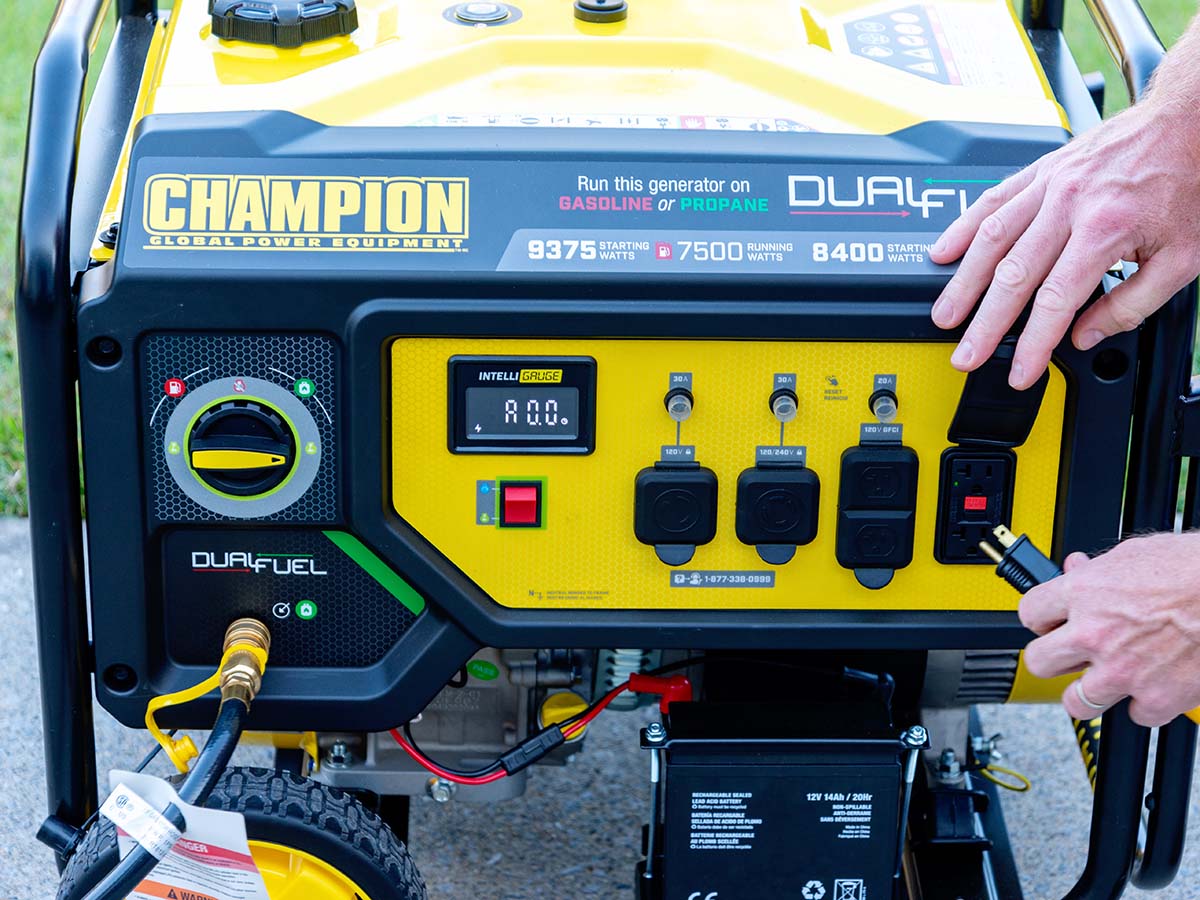
How We Tested the Best Propane Generators
The propane generators that made our list provide different levels of electrical output, so they’re well suited for a range of backup power uses. We carefully researched more than 35 of the top-selling models and then chose several for real-world testing. We considered brand to an extent—manufacturers like Champion, Westinghouse, and DuroMax are well respected in the generator industry. Still, we didn’t automatically eliminate smaller or niche brands if they ranked highly with users. Our primary goal was to determine the best propane generators in various price ranges so our readers would know what to expect from the models.
Testing began with assembly if the generator wasn’t completely assembled already. Then, since all the models on our list are also used with gasoline, as the manufacturers recommended a break-in period with gas, that task was performed before running the units on propane. Electrical output was tested by plugging in a range of power tools, appliances, and electrical devices. We used an online wattage calculator to help us estimate the correct wattage for testing.
We also assessed the noise level of each generator. Because many generators are inherently loud, not unlike gas-powered lawn equipment, we rated noise on whether the generator’s noise matched the expected noise level. If it was noticeably worse, we rated it worse; and if it was noticeably better, we rated it better. Overall, we found that all of these generators had comparable sound levels for their power output.
We moved the generators to assess portability, an especially important consideration for those who take them to jobsites or camping. In addition to noise and portability, we also rated the generators on overall power, ease of use, and value for the price.
Testing Stats
Products tested: 7
Hours spent testing: 40
Tests performed: 5
Average price: $719
Our Top Picks
Whether you prioritize portability, price, or some other feature, any of the generators below can help keep a fridge running, power a sump pump, keep the lights on, and keep a heater or AC powered when a home is without power.
Best Overall
Westinghouse WGen9500DF Dual-Fuel Generator
Product Specs
- Wattage: Propane: 11,200 peak watts and 8,500 running watts; gasoline: 12,500 peak watts and 9,500 running watts
- Fuel: Propane or gasoline
- Outlets/ports: Four 120-volt (V)-20-amp (A) ground-fault circuit interrupter (GFCI) outlets, one 120V/240V-30A locking outlet, and one 120/240V-50A outlet
- Weight: 211 pounds
Our Ratings: Ease of Use 4.5/5; Power 5/5; Portability 4/5; Noise 4/5; Value 4.5/5
What We Like
- Runs on either gasoline or propane, making it versatile in most situations
- Features electric start, remote start, and recoil start options
- Powerful 457 cubic centimeter (cc) 4-stroke engine for strong electrical generation
- Features digital data display for real-time information about voltage, frequency, and runtime
What We Don’t Like
- On the heavy side at 211 pounds, making it challenging to lift onto a truck bed
With a full, standard 20-pound propane tank, the Westinghouse WGen9500DF will generate enough electricity to run several household appliances and power tools for up to 7 hours when pulling 50 percent load. It’s also equipped with a 6.6-gallon gasoline tank. As with most propane generators, the Westinghouse WGen9500DF is dual fuel, so users can select the fuel they prefer.
We tested the WGen9500DF while running both propane and gas, and we didn’t note any real power differences. However, the manufacturer lists slightly lower available wattage when using propane (11,200 peak and 8,500 running) compared to 12,500 peak watts and 9,500 running watts when using gas. We were able to run several large appliances plus power tools without reaching maximum load capacity.
We didn’t notice any difference in noise levels between the two fuels, but it is loud enough to potentially annoy neighbors—about as loud as a gas lawn mower. However, its noise is in line with that of other generators with similar power output. This generator is also on the heavy side, topping out at 211 pounds when empty of fuel.
Thanks to its wheel kit, it’s not difficult to pull on a flat surface, but it will take at least two strong people to lift it to the bed of a pickup truck. Overall, it’s tough to beat the WGen9500DF for power output, fuel versatility, and easy startup—all vital features that make it easier to weather power outages.
Read our full review: Westinghouse WGEN9500DF Dual-Fuel Generator
Get the Westinghouse propane generator at Acme Tools or Family Farm and Home.
Best Bang for the Buck
Pulsar 2200-Watt Dual-Fuel Quiet Inverter Generator
Product Specs
- Wattage: Propane: 2,000 peak watts and 1,600 running watts; gasoline: 2,200 peak watts and 1,800 running watts
- Fuel: Propane or gasoline
- Outlets/ports: Two 120V-15A AC outlets and one USB-A port
- Weight: 46.5 pounds
Our Ratings: Ease of Use 4/5; Power 4.5/5; Portability 5/5; Noise 4/5; Value 4.5/5
What We Like
- Light enough to move around without strain
- Easy to set up and get the engine running
- Ability to run on either propane or gasoline for increased versatility
What We Don’t Like
- Access panel to change the oil is difficult to remove
- Changing the oil requires tipping the generator on its side, making it difficult to balance
We tested the Pulsar 2,200-watt generator and found it to be a great option for powering small tools and devices. With a 1.18-gallon fuel tank and the ability to run either gasoline or propane, the generator is capable of supplying 1,800 watts while running, peaking at 2,200 watts.
Setup was initially difficult. To access the oil fill port, we had to pop off a side panel; that panel required a bit more manual force than we anticipated. However, once we got it off, getting the generator ready for the first time only took a few minutes. The recoil just needed a couple of pulls, and the engine quickly came to life. Our test rig included a couple of heat guns and hair dryers running at the same time on different high and low settings to vary the load.
We found the generator handled 1,800 watts as advertised but noise levels seemed higher. Pulsar’s specs state about 60 decibels, which is about the sound level of conversation; while it seemed louder than that to us, more like the sound of a vacuum, it was about the sound level we’d expect from a generator of its size.
This generator is a great option for light-duty power needs such as small DIY projects and powering a couple of household appliances during an outage.
Get the Pulsar propane generator at Amazon or Walmart.
Best Medium-Duty
Champion 7500-Watt Dual-Fuel Generator
Product Specs
- Wattage: Propane: 8,400 peak watts and 6,750 watts running; gasoline: 9,375 peak watts and 7,500 running watts
- Fuel: Propane or gasoline
- Outlets/ports: Four 120V-20A GFCI outlets, one 120V-30A locking outlet, and one 120V/240V-30A locking outlet
- Weight: 205 pounds
Our Ratings: Ease of Use 4.5/5; Noise 4/5; Portability 4/5; Power 5/5; Value 5/5
What We Like
- Runs up to 10 hours per tank of gas or 5.5 hours per tank of propane at 50 percent load
- 6 outlets, including a 120/240V-30A outlet for high-draw applications like home backup
- “Intelligauge” screen displays power output and runtime hours in real time
- One of the best watts-per-dollar values for a dual-fuel generator
What We Don’t Like
- Higher fuel consumption per watt produced than the most efficient portable generators
- Heavy at 205 pounds; difficult to maneuver on unpaved ground
This Champion 7,500-watt dual-fuel generator delivers enough electricity to power up an off-grid jobsite or keep critical home circuits running through a utility outage. It includes numerous features standard to more expensive models, like a push-button electric starter, covered outlets, and a rugged tubular steel frame with 10-inch wheels and a fold-out transport handle.
In our tests, the push-button starter worked perfectly, no matter the weather. We appreciated its two locking 30A outlets (one 120V and one 120/240V) for powering a home, workshop, RV, or heavy-duty tools like portable welders. It also has four household-style 120V-20A outlets for lower-wattage applications. This generator supports a 50 percent load for up to 10 hours on a 7.7-gallon tank of gas or up to 5.5 hours with a 20-pound propane cylinder. Using propane, we ran a portable table saw, miter saw, router, and air compressor for 4 hours and had just under half a tank of propane left over.
The Champion does have a few drawbacks, however. Despite wheels and a handle, its heavy weight made it tough to navigate across a yard and lift in and out of a truck. It also does not include an idle controller, which leads to more fuel consumption than eco-throttle-equipped generators. Still, it offered plenty of power and access points at a value price.
Read our full review: Champion 7500-Watt Dual-Fuel Generator
Get the Champion 7500-watt propane generator at Blain’s Farm & Fleet or Acme Tools.
Best Heavy-Duty
Champion 8500-Watt Dual-Fuel Generator With CO Shield
Product Specs
- Wattage: Propane 9,565 peak watts and 7,650 running watts; gasoline: 10,625 peak watts and 8,500 running watts
- Fuel: Propane or gasoline
- Outlets/ports: Four 120V-20A GFCI outlets, one 120V-30A locking outlet, and one 120/240V-30A locking outlet
- Weight: 209 pounds
Our Ratings: Ease of Use 5/5; Noise 4/5; Portability 5/5; Power 5/5; Value 5/5
What We Like
- Runs on both gasoline and propane, making it versatile for different users
- Suits a range of power needs with 6 outlets: two 30A and four 20A
- Built-in carbon monoxide shutoff is an added safety feature
What We Don’t Like
- Relatively heavy at 209 pounds—too heavy for 1 person to lift into a truck bed
This Champion 8,500-watt generator is designed as an emergency backup generator, but it’s just as valuable as an off-grid power source. It runs on gasoline, and users can also connect it to a propane tank for quick power-ups. The Champion comes assembled, other than installing its wheel kit. It features two 30A locking AC outlets and four 20A GFCI outlets. It has a digital display that shows runtime and power output. Safety is also a top priority with the Champion—it shuts down if its built-in carbon monoxide detector registers a hazardous gas level.
During our tests, we used the Champion to run several power tools and appliances, and also connected it to a travel trailer’s 30A cord. It generated enough power to run all the appliances without flipping any breakers, even at maximum load. This unit is heavy, though. It weighs 209 pounds without fuel, making it challenging to lift without help.
For those looking for a powerful backup generator to run several tools or appliances simultaneously, the Champion 8,500-watt is a solid option.
Read our full review: Champion 8500-Watt Dual-Fuel Generator with CO Shield
Get the Champion 8500-watt propane generator at Lowe’s, Tractor Supply Co., The Home Depot, or Acme Tools.
Best Backup Power
Wen DF1100T Dual-Fuel Generator With Wheel Kit
Product Specs
- Wattage: Gasoline: 11,000 peak watts and 8,300 running watts; propane: 9,500 peak watts and 7,500 running watts
- Fuel: Gasoline or propane
- Outlets/ports: Four 120V-20A GFCI outlets, one 120V-30A locking outlet, one 120V/240V-50A outlet, and one 12V DC outlet
- Weight: 214 pounds
Our Ratings: Ease of Use 4.5/5; Power 5/5; Portability 4/5; Noise 4/5; Value 5/5
What We Like
- Powerful output—up to 8,300 running watts on gas and up to 7,500 running watts on propane
- Easy to choose between using gasoline or propane—just flip a switch
- Electric start eliminates the struggle sometimes associated with pull-type recoil models
- Large 6.6-gallon gasoline tank offers half-load runtime of up to 8.5 hours
- Multiple outlets for versatile usage: 4 standard household outlets plus a 30A and a 50A outlet
What We Don’t Like
- Heavy at 214 pounds, which reduces portability and being able to lift to a truck bed
For a propane generator that’s ready to go at a moment’s notice in case of an outage, the Wen DF11000T is a great option. This powerful generator produces 11,000 peak watts (required to start a powerful tool like a saw) and 8,300 running watts when using gasoline. It provides slightly less power when operating on propane—9,500 peak watts and 7,500 running watts—but that’s still a lot of electrical power.
After the initial break-in period, we plugged in several items (not all at once), including a chest freezer, full-size fridge-freezer, laptop, tankless water heater, shop lights, table, chop saw, and circ saw. The Wen didn’t even seem to be under any load, except for a split-second surge when we started up one of the saws—saws are notorious for drawing a lot of power on startup. We tested all the tools and items we could think of and had no problems.
Then, we did it all again while running the Wen on propane. We got the same excellent results, and switching from gasoline to propane only required flipping a switch. This model comes with an electric start and has a large 6.6-gallon tank that will keep it running for up to 8.5 hours at a 50 percent load. It features four standard household outlets, a 30A outlet, and a 50A outlet.
Like many fuel-powered generators (if they aren’t inverters), the Wen is pretty loud—maybe about as loud as a gas lawn mower—but, based on our tests, that’s a small price to pay for the hefty amount of power this durable generator provides.
Get the Wen propane generator at Amazon, Walmart, or Wen.
Jump to Our Top Picks
What to Consider When Choosing a Propane Generator
While power output is perhaps the most important attribute of a propane generator, factors such as portability, noise level, and outlet types are also important to consider when shopping for one of these models.
Wattage Output
The sole purpose of a generator is to supply power when no conventional means of power are available. They step in to fill the gap during a power outage or at campgrounds with no electrical hookups. With that in mind, the output of the generator is crucial.
Generators are rated by how much wattage they produce. Most generators capable of functioning off a propane fuel tank have a wattage range of 1,000 for compact models to more than 10,000 for larger units. Most generators have two ratings: peak wattage (also called starting wattage) and running wattage.
The starting wattage is the amount of power a generator can supply in short bursts. This is to account for most electrical appliances, which typically require a higher starting wattage but significantly fewer watts to run.
Sufficient generator wattage to run several essential appliances in many homes would need to be around 5,000 watts or more. This is enough power to run a 600-watt refrigerator and a 1,500-watt space heater or a 1,000-watt window air conditioner as well as an 80-watt 42-inch LED TV, 100-watt computer, and most lighting in the home—especially if the lights are low-wattage LED bulbs. Keep in mind that this is only a measure for running some bare essentials in the case of an outage; it’s not enough power to run all the appliances, including an HVAC unit, water heater, or dryer, for instance, at the same time.
While some generators are powerful enough to run home HVAC systems, most homes are not wired for this setup. A generator powerful enough to run an entire household is typically known as a “whole-house” or “standby” generator, and it’s permanently wired to a transfer switch that allows it to come on automatically when the grid power goes down.
Dual Fuel
The vast majority of propane generators are dual-fuel generators. This means they can run off either a 20-pound propane fuel tank or unleaded gasoline. Some can even switch fuels while running. One advantage of a propane generator is that propane fuel can be stored for long periods of time without degrading.
This allows you to keep a supply of tanks on hand in case of a power outage, which is a lot easier than making a run for gasoline amid a widespread power outage or dangerous ice storm.
Exhaust and Safety
Propane is a fossil fuel that puts out fewer pollutants than gasoline. This means there are fewer fumes to worry about in the yard or at the campsite. This does not mean a propane generator is safe for use in an enclosed space.
Although propane generators produce little carbon monoxide compared to gasoline-powered generators, carbon monoxide is released when propane burns and can fill up an enclosed space. Carbon monoxide is odorless and colorless, dangerous and deadly. Remember, never use a propane generator in an enclosed space.
Portability
Because of the exhaust generators produce, they are safest when placed downwind from doors and windows and kept a distance from the house, according to the Portable Generator Manufacturers’ Association (PGMA). Manufacturers will typically specify how many feet away is a safe distance. For this reason, many have large handles and wheels or other features to make them portable.
This does not mean that generators are lightweight: Most propane generators weigh more than 100 pounds. Lightweight models with outputs of around 2,000 watts can weigh as little as 45 pounds, but heavy-duty generators that put out more than 10,000 watts can weigh over 300 pounds.
Noise
Generators are notoriously loud, as indicated by their decibel ratings, often listed in product specifications (though not all manufacturers list a rating). Most generators run at about 70 to 85 decibels, similar to a car engine’s sound. Quieter generators run at around 55 to 60 decibels. Keep in mind that a generator running at full capacity will be louder than the same generator running at 50 percent of its maximum load.
Outlets
As is the case in our homes, outlets are the means through which appliances access the power created by a generator. All generators feature standard 120V outlets, with most having between two and four. Generators with outputs of 4,000 watts or more generally have 240V twist-lock outlets for large appliances, such as clothes dryers and electric ranges.
Some models also include 12V outlets, which are outlets similar to cigarette lighters in vehicles. RV-ready outlets feature special 30A or 50A outlets for powering a travel trailer or motor home.
FAQs
If you’re wondering about how much fuel a propane generator uses or how safe it is to use a propane generator, read on for answers to some of the most commonly asked questions about these machines.
It varies widely, based on the type of generator (inverter generators can use less fuel than noninverter types) and how much wattage the generator produces. On average, a portable generator may burn 0.2 to 1 gallon of propane per hour for every 1,000 watts of power it produces.
A propane generator’s noise level is related to power output—high-capacity generators tend to produce more noise than smaller ones, but the generator’s mechanical design also factors in.
Traditional generators that produce 6,000 or more watts generally run at around 70 to 85 decibels, whereas a smaller (or inverter) generator can produce between 50 to 60 decibels.
Propane actually has some safety advantages over gasoline. It produces fewer toxic fumes and does not pose as great a fire hazard as gasoline, which can spill. Propane is not susceptible to spills because it is contained in a pressurized canister.
To use a propane generator safely, make sure to set up the generator in an open space away from any enclosures, including an open garage.
Meet the Testers
Glenda Taylor is a contractor, product tester, and writer. With experience in both residential and commercial building applications, she focuses primarily on construction, woodworking, and DIY tools and techniques.
Additional testing performed by Corey Foster, Austin Fracchia, Becky Helzer, Zach Lazzari, Tom Scalisi, and Mark Wolfe. The Bob Vila test team is made up of contractors, remodelers, home design enthusiasts, and freelancers from across the nation. Each member is dedicated to delivering high-quality product information to our readers so they can shop with confidence, knowing the products they purchase have been fully tested and vetted.
Additional research provided by Tony Carrick.
